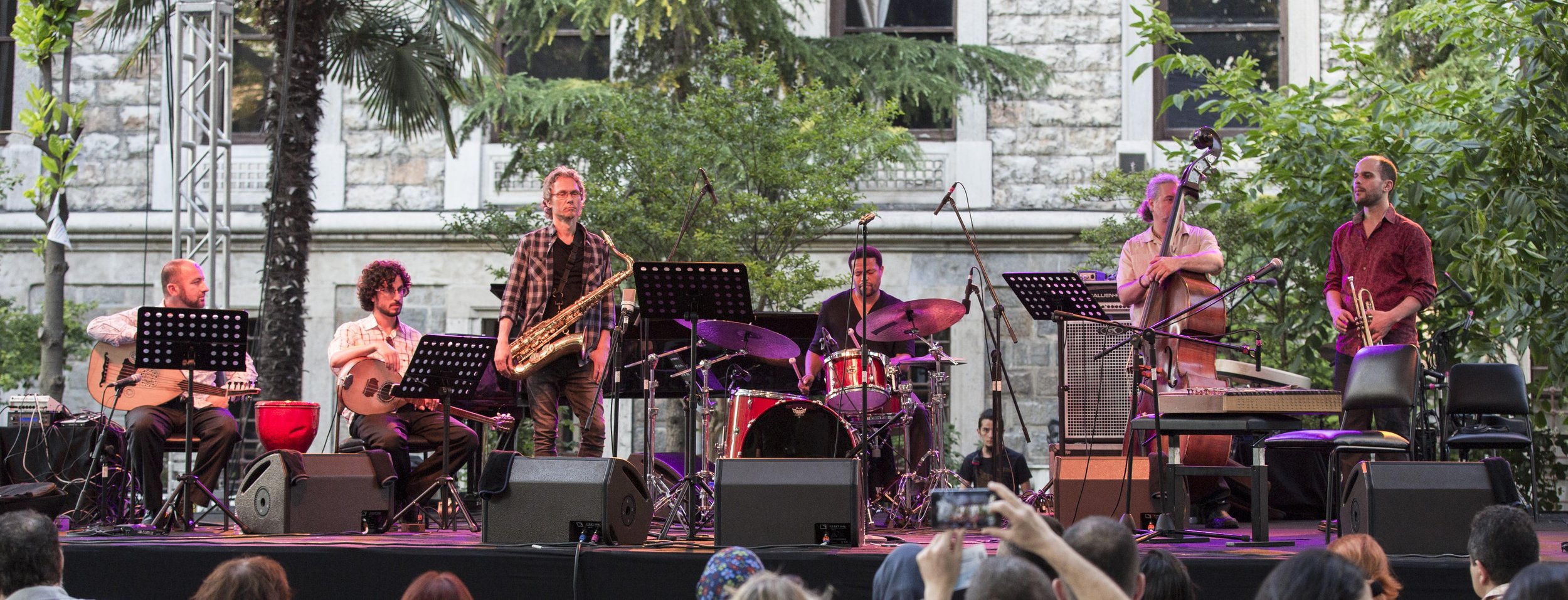Two Rivers
The Two Rivers Ensemble is a sextet of jazz and Middle Eastern musicians that has made innovative strides in in using the maqam modal system with the American jazz idiom. Deeply rooted in musical forms of Iraq and nearby regions, the music still speaks the language of swing, improvisation and group interaction, and the resultant sound is distinct from other contemporary cross-cultural musical fusions. After 14 years of extensive performing and touring and the release of three critically-acclaimed albums on Pi Recordings, Inana (2011) Two Rivers (2007), and Crisis (2015), the Two Rivers Ensemble has developed an instinctive ease with ElSaffar’s highly complex music, enabling the band to play with a creativity that transcends pure technical challenge in a style that is rooted in tradition, while creating an entirely new aesthetic. Amir ElSaffar’s work “Crisis”, was commissioned by the Newport Jazz Festival, where it premiered in August 2013, which Downbeat Magazine called “certainly the first Middle Eastern-imbued jazz combo at Newport to win a standing ovation for its first song.” Crisis was released on Pi Recordings in July 2015. View the official Crisis press release here and watch the video EPK below.
“ElSaffar has found a beautiful and singular way of pairing the sibling spirits of jazz and the classical maqam system of the Arab world, with their shared spheres of improvisation, deep knowledge of tradition and urge to keep innovating.” – Anastasia Tsioulcas on the Two Rivers Ensemble – NPR Music
ELSAFFAR’S ‘GLOBAL FUSION’ HEATS UP WINTER JAZZFEST
“The third set of the night proved to be one of the most beautiful of the entire festival. Trumpeter Amir ElSaffar was born in the States and learned jazz here, but he studied maqam— the traditional Arabic music system—in Baghdad. His fusion of the two traditions in his Two Rivers sextet project resulted in numerous remarkable moments. It’s not every day that one hears a jazz bouzouki solo, like the lovely one Tareq Abboushi fired off in “The Great Dictator.” That tune reflected a strong Middle Eastern influence, yet also tinkered with an Ornette Coleman-like aesthetic in its ensemble passages. Saxophonist Ole Mathisen, too, adopted Coleman’s energy in the exhilarating solo that followed Abboushi’s. Whether by accident or design, ElSaffar’s music suggested other global musical connections. His languid trumpet tones on “Love Poem” evoked the sonorities and tremolos of flamenco music, mindful perhaps of the Moorish influence in Spanish music. (These crossed paths with Mathisen’s sax in a counterpoint line that lay against a bass/drum/bouzouki groove.) When he switched to the santur (an Iranian hammered dulcimer) on the following tune, it carried with it echoes of similar instruments used in Eastern Europe. The sound was exotic yet familiar, lyrical and longing. Contributions by bassist François Moutin and drummer Nasheet Waits—two masters on their respective instruments—were understated but essential. While he mines the musical fusion that remains at the heart of all jazz, ElSaffar is also crafting something thoroughly original and wonderful. He’s one of the most exciting voices on the scene today, and it’s no slight to the other acts to say that the trumpeter had quite simply stolen the show.” – Downbeat Magazine
Listen to the Two Rivers Ensemble performance at Newport Jazz Festival 2013 on NPR Music’s JazzSet with Dee Dee Bridgewater.
Check out Two Rivers performance at the Newport Jazz Festival
“★★★★★…what ElSaffar is doing on Crisis is unique in music…from a political and historical vantage point, the task of narrating complex global events through instrumental music is more than challenging. ElSaffar has not only commendably told this personal and globally important story but has produced a masterpiece of a recording in doing so.” – Karl Ackermann, All About Jazz .
“Two Rivers includes Nasheet Waits, one of the most dynamic drummers in jazz who is best known as a mainstay in Jason Moran’s Bandwagon; bassist Carlo DeRosa, whose CD Brain Dance achieved considerable acclaim; Tareq Abboushi on buzuq (long-necked lute) whose CD, Mumtastic, contains his own blend of jazz and Arabic forms; multi-instrumentalist and virtuoso Zafer Tawil, who is one of the most in-demand Arab musician in New York; and tenor saxophonist Ole Mathisen, a master of microtonal playing who contributes beautifully controlled and technically dazzling playing, serving as the perfect foil to ElSaffar on the front line.”
“The band navigates ElSaffar’s still-fresh fusion of jazz and maqam with such masterful technical power and vivid lyrical imagination that you almost immediately forget to be engrossed by the novelty of the sound.” – Peter Margasak, Chicago Reader
